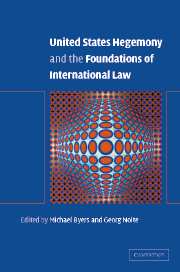Crossref Citations
This Book has been
cited by the following publications. This list is generated based on data provided by Crossref.
Weiss, Thomas G.
2004.
The Sunset of Humanitarian Intervention? The Responsibility to Protect in a Unipolar Era.
Security Dialogue,
Vol. 35,
Issue. 2,
p.
135.
Koskenniemi, Martti
2004.
International law and hegemony: a reconfiguration.
Cambridge Review of International Affairs,
Vol. 17,
Issue. 2,
p.
197.
Anghie, Antony
2005.
Imperialism, Sovereignty and the Making of International Law.
Franceschet, Antonio
2005.
The Politics of Global Legalism and Human Security.
Policy and Society,
Vol. 24,
Issue. 1,
p.
1.
Campbell, Colm
2005.
‘WARS ON TERROR’ AND VICARIOUS HEGEMONS: THE UK, INTERNATIONAL LAW, AND THE NORTHERN IRELAND CONFLICT.
International and Comparative Law Quarterly,
Vol. 54,
Issue. 2,
p.
321.
Martin, Pierre-Marie
2005.
Regards critiques sur quelques (r)évolutions récentes du droit.
p.
349.
2006.
Internationale Politik studieren.
p.
187.
Schwarz, Hans-Peter
2007.
Deutsche Außenpolitik.
p.
569.
Campbell, Colm
2008.
Emergencies and the Limits of Legality.
p.
172.
Dunoff, Jeffrey L.
2008.
Authority in the Global Political Economy.
p.
55.
Kadir, M.Yakub Aiyub
2008.
Towards a New Paradigm of the Right to Self-Determination in the World Trading System.
SSRN Electronic Journal,
Hajjar, Lisa
2009.
Does Torture Work? A Sociolegal Assessment of the Practice in Historical and Global Perspective.
Annual Review of Law and Social Science,
Vol. 5,
Issue. 1,
p.
311.
Johnstone, Ian
2009.
Cooperating for Peace and Security.
p.
187.
Schwarz, Jürgen
2010.
Handbuch der Internationalen Politik.
p.
353.
Fawcett, Louise
and
Gandois, Helene
2010.
Regionalism in Africa and the Middle East: Implications for EU Studies.
Journal of European Integration,
Vol. 32,
Issue. 6,
p.
617.
Dunoff, Jeffrey L.
2011.
What is the purpose of international law?.
International Theory,
Vol. 3,
Issue. 2,
p.
326.
2013.
International Human Rights Law and Practice.
p.
9.
Knox, Robert
2013.
Civilizing interventions? Race, war and international law.
Cambridge Review of International Affairs,
Vol. 26,
Issue. 1,
p.
111.
Ratner, Steven
2013.
Ethics and international law: integrating the global justice project(s).
International Theory,
Vol. 5,
Issue. 1,
p.
1.
FEHL, CAROLINE
2014.
Unequal power and the institutional design of global governance: the case of arms control.
Review of International Studies,
Vol. 40,
Issue. 3,
p.
505.





